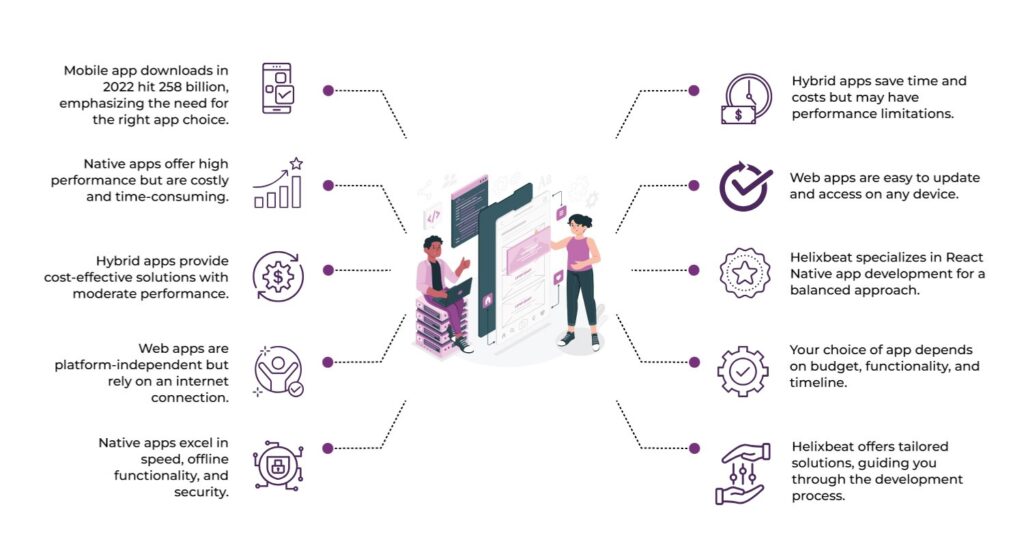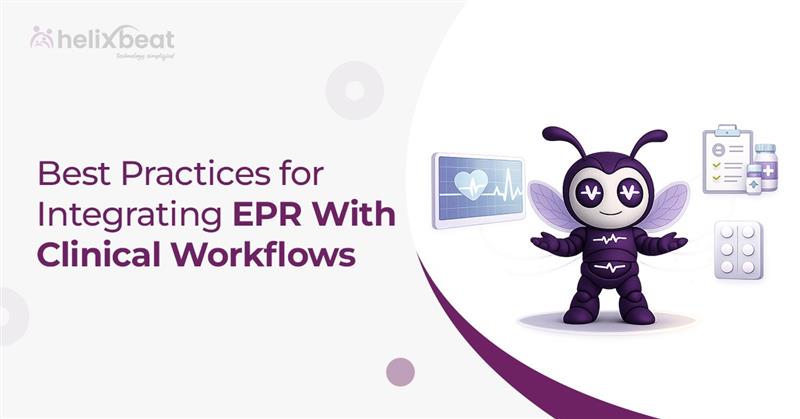Did you know? In 2022, mobile app downloads reached a massive 258 billion and generated over $430 billion in revenue. With these vast numbers, we can understand why businesses are rushing to build apps. But the big question is: what is the best type of app for your business – Native, Hybrid, or Web?
Native apps are known for their high performance and full access to device features, but they can be expensive and take more time to develop. The right React Native App Development Company will build your apps to balance performance, cost, and user experience effectively. Hybrid apps, on the other hand, are a more cost-effective choice, allowing you to develop once and deploy across multiple platforms. And then there are web apps, great for instant updates and cross-platform use, but they’re not as fast or feature-rich as native apps.
In this blog, you will learn the differences between native, hybrid, and web apps, which will help you pick the right app for your business.

Table of Contents
What are Native Apps?
Native apps are designed for a specific platform, such as iOS or Android, using platform-specific programming languages like Swift for iOS and Kotlin for Android. These apps offer high performance by directly utilizing the device’s hardware, such as the camera, GPS, and notifications.
We can say Instagram is an example of a native app which has separate versions for iOS and Android to ensure optimal performance on each platform.
While native apps provide superior speed and functionality, they come with higher development costs and longer timelines because of building separate apps for each platform.
Advantages and Disadvantages of Native Apps
Native apps have become a popular choice for businesses offering high-performance and feature-rich mobile experiences. In the second quarter of 2024, consumers spent approximately 36.2 billion U.S. dollars across the Apple App Store and Google Play combined.
Advantages of Native Apps
- Superior Performance: Native apps are optimised for their specific platform, allowing them to run faster and smoother. Since they directly access the device’s hardware, they deliver a seamless user experience.
- Offline Functionality: Native apps can work without an internet connection, providing a better experience for users in areas with low or no connectivity.
- High Security: Native apps tend to have better security as they are specifically designed for the platform and can utilize its built-in security features.
Disadvantages of Native Apps
- High Development Costs: Since native apps are built separately for iOS and Android, the development process is more expensive and time-consuming than other apps.
- Longer Time to Market: With separate development for each platform, native apps take longer to build, which can delay their release.
- Maintenance Challenges: Native apps require ongoing maintenance and updates for each platform separately, leading to higher maintenance costs.
If you’re looking for an alternative with more flexibility and efficiency, you might consider partnering with a React Native app development company. These companies specialise in building cross-platform apps that can offer a native-like experience at a lower cost.
What are Hybrid Apps?
Hybrid apps combine elements of both native and web apps. Built using web technologies like HTML, CSS, and JavaScript, they are connected in a native container to run on multiple platforms like iOS and Android. This approach allows businesses to use a single codebase, saving time and cost compared to building separate native apps.
A good example is Facebook, which uses a hybrid app framework to offer similar functionality on both platforms. While hybrid apps are more cost-effective, they may not deliver the same performance or responsiveness as native apps.
If you choose this approach, partnering with a React Native app development company can help you more effectively leverage hybrid technologies.
Advantages and Disadvantages of Hybrid Apps
- In 2024, 88% of startups opted for hybrid app development over native solutions, highlighting the growing preference for this option due to its flexibility and cost efficiency.
Advantages
- Cost-Effective: Hybrid apps reduce development and maintenance costs by using a single codebase for both iOS and Android.
- Faster Time-to-Market: The shared codebase allows for quicker development cycles, enabling businesses to launch their apps faster.
- Easier Updates: Since the app’s core is web-based, updates can be rolled out more easily across platforms.
Disadvantages
- Performance Limitations: Hybrid apps may not perform as well as native apps, especially for complex or resource-intensive tasks.
- User Experience: Achieving a seamless user experience can be challenging, as hybrid apps might not fully align with platform-specific design guidelines.
- Limited Access to Device Features: While hybrid apps can access device features through plugins, they might not have the same level of integration as native apps.
What are Web Apps?
Web apps are applications that run directly in a web browser, using technologies like HTML, CSS, and JavaScript. They don’t need to be downloaded or installed, making them easy to access from any device with a browser and internet connection.
Google Docs is an example of a web app which lets users create and edit documents online. It is cost-effective and platform-independent, but they rely on an internet connection. It won’t offer the same performance or device integration as native apps.
Advantages and Disadvantages of Web Apps?
In 2023, the global market for Progressive Web Apps (PWAs) was valued at $1.13 billion, with projections to reach $10.44 billion by 2027, indicating a growing adoption of web-based applications across industries.
Advantages
- Platform Independence: Web apps can run on any device with a web browser, eliminating the need for separate versions for different operating systems.
- Easy Updates: Updates are made on the server side, so users always access the latest version without needing to download updates.
- Accessibility: Users can access web apps from anywhere, providing flexibility for remote work and global reach.
Disadvantages
- Internet Dependency: Web apps require a stable internet connection to function, which can be a limitation in areas with poor connectivity.
- Limited Device Integration: Access to device-specific features like the camera or GPS can be limited compared to native apps.
- User Experience: The user experience may not be as seamless as native apps, potentially affecting user satisfaction
Key Differences between Native, Hybrid, and Web Apps
| Feature | Native Apps | Hybrid Apps | Web Apps |
| Development | Built separately for each platform (iOS/Android) | Single codebase for multiple platforms | Developed using web technologies (HTML, CSS, JavaScript) |
| Performance | High performance, fast, and responsive | Moderate performance, less responsive | Slower performance, depends on internet connection |
| Platform Dependency | Platform-specific (iOS or Android) | Cross-platform (works on both iOS and Android) | Platform-independent (works on any device with a browser) |
| Access to Device Features | Full access (camera, GPS, etc.) | Limited access via plugins or APIs | Limited access to device features |
| Development Cost | High, as separate apps need to be developed for iOS and Android | Lower, as a single codebase is used for both platforms | Lowest, as only one version is developed for all platforms |
| User Experience | Best, customised to platform design guidelines | Moderate, may not fully align with platform design | Varies, may not be as seamless as native or hybrid apps |
| Maintenance | Requires updates for each platform separately | Easier to maintain due to a single codebase | Easy updates, as they are done on the server side |
Build Your Web App with Helixbeat’s Software Development Service
At Helixbeat, we transform your ideas into high-performing web apps. As a trusted software development company, we offer customised solutions to your unique business needs.
With over a decade of experience, our team combines technical expertise, innovation, and a customer-first approach to ensure your project’s success.
Our agile development models ensure your product launches in the market faster. We also provide end-to-end support, guiding you through every phase, from ideation to deployment.
Partner with Helixbeat today to build a web app that stands out in the competitive market.
FAQ:
1. What are React Native App Development Services?
React Native app development services involve building cross-platform mobile apps using React Native, allowing businesses to create apps for both iOS and Android with a single codebase.
2. Is React Native enough for App Development?
Yes, React Native is suitable for most app development needs. It offers cross-platform support and good performance, but complex native features may require additional native code.
3. Which language is used in React Native?
React Native uses JavaScript as its primary language, with native code (Swift for iOS, Java/Kotlin for Android) used for platform-specific features.
4. Is React Native frontend or backend?
React Native is primarily used for frontend development, focusing on the user interface, while it can integrate with backend services for data handling.
5. Which is better, React Native or Flutter?
Both are great but React Native has a larger community and a proven track record. Flutter offers better performance and customization, but the choice depends on project needs.
6. What is a React Native App Development company?
A React Native app development company specialises in building mobile apps using the React Native framework. They offer services like app design, development, testing, and maintenance for both iOS and Android with a single codebase, helping businesses create cross-platform, high-performance apps.













